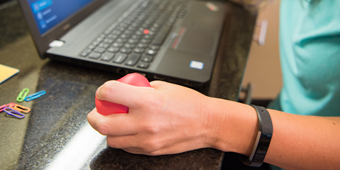8 Myths About Colorectal Cancer

Find Your Perfect Match
Answer a few questions and we'll provide you with a list of primary care providers that best fit your needs.
Colorectal cancer is among the most common cancers in America. It’s the number 2 cancer killer in the U.S. among men and women combined.
Some common ideas about colorectal cancer are just plain wrong. Don’t be fooled. Know the facts to get on the right track to preventing colorectal cancer.
Check how much you know:
1. Myth: Colorectal cancer is a man’s disease.
Fact: Although colorectal cancer is slightly more common in men than women, it still is the number 3 cancer affecting women, behind lung and breast cancer. According to the American Cancer Society, the lifetime risk of developing colorectal cancer is about one in 23 (4.4 percent) for men and one in 25 (4.1 percent) for women.
2. Myth: Colorectal cancer cannot be prevented.
Fact: Colorectal cancer is highly preventable. Increased awareness and screening. could save an estimated 30,000 lives each year. Screening tests such as colonoscopy may detect and remove polyps (fleshy growths on the lining of the colon) and other abnormal tissue that could lead to colorectal cancer. Removal of these polyps can prevent colorectal cancer from developing.
In addition, being physically active, maintaining a healthy weight, eating a high-fiber/low-fat diet, limiting alcohol and avoiding tobacco help protect your colon and rectum.
3. Myth: African Americans are not at risk for colorectal cancer.
Fact: African-American men and women get colorectal cancer at higher rates than men and women of any other U.S. racial or ethnic group. They also have more deaths from colorectal cancer than other groups. The reason for this is not yet understood.
4. Myth: Age isn’t a factor in getting colorectal cancer.
Fact: Colorectal cancer occurs most frequently in people age 45 and older. The American Cancer Society recommends that you start getting cancer screenings when you’re 45.
Some common ideas about colorectal cancer are just plain wrong
If you have a personal or family medical history of polyps or colorectal cancer, your doctor may recommend that screening start at a younger age.
5. Myth: Only women over age 45 who are having symptoms or problems should be screened for colorectal cancer or polyps.
Fact: Even if you have no problems or symptoms, you should get a baseline screening at age 45. Colorectal cancer is most treatable in its early stages, before symptoms occur.
6. Myth: A colonoscopy is painful and requires an overnight stay in the hospital.
Fact: Colonoscopy is an outpatient procedure. You receive a mild sedative before the procedure so you can rest comfortably and without pain. A flexible, slender tube is inserted into your rectum to examine the lining of the colon and rectum. The test is safe and the procedure itself typically takes 30 to 45 minutes. Recovery takes about an hour. After that, you are free to go home.
7. There are no effective tests to screen for colorectal cancer.
Fact: Tests used for screening for colon cancer include digital rectal exam by your doctor, stool test to check for blood, barium enema to take x-ray pictures of your colon, flexible sigmoidoscopy and colonoscopy (scopes that look inside the colon). All of these help detect cancer or precancer before you notice any warning signs. Your doctor can recommend whether one or more screening tests is right for you.
8. Screening is a waste of time, because colorectal cancer isn’t treatable anyway.
Fact: Colorectal cancer is often highly treatable. If it’s found and treated early (while it’s small and before it has spread), the 5-year relative survival rate is about 90 percent. People with colorectal cancers at other cancer stages also survive, although numbers decline as the cancer grows and spreads. In any case, factors such as age, overall health and how well cancer responds to treatment affect a person’s overall outcome. Researchers are making improvements all the time to make cancer treatments and procedures more effective.
Find Your Perfect Match
Answer a few questions and we'll provide you with a list of primary care providers that best fit your needs.
Source: American Cancer Society, American Society for Gastrointestinal Endoscopy




